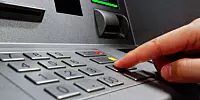-
French banks applying ‘irregular’ charges on clients, fraud office check reveals
The investigation into 100 banking establishments found breaches, failings, and alleged criminal practices
-
How bank cashpoints are changing in France
New ATMs under the brand name ‘Cash Services’ will expand (a little) their services
-
Tips for reducing your bank charges in France
From overdraft to withdrawal fees, as well as online banking, we look at ways to save
Bank fees, overdrafts and dangers of debt
The French pay on average €230 a year in bank charges, a study has found – but fees range from a low of €5 at the internet bank BforBank to a high of €290 at BNP Paribas Particuliers.

The figures came from comparing real sums paid by customers, not official rates, and were compiled by the money management application Bankin. Unsurprisingly, internet banking was the cheapest, with BforBank top at €5 and Fortuneo, €8, and Boursorama, €16, at second and third.
One high cost can be going over an authorised overdraft. A study, by the bank comparison site Panoramabanques, found that six out of 10 people do this at least once a year, incurring on average €60 of charges due to the high interest rates charged. What is more almost a quarter of people (23%) do this at least once a month.
One consequence of repeated unauthorised overdrafts is that the bank can close the account, sometimes with just a legal minimum 30 days’ notice for the client to transfer funds elsewhere.
Inactivity, improper use of the account or just poor account management may all trigger closure, with each bank’s rules for this detailed in the convention de compte, which is given out to clients as they open an account.
If this happens you will have to refund money owing before the closure date, otherwise you risk an interdit bancaire, meaning you are listed on a central register and lose the right to a chequebook, credit card or overdraft. The best bet may be to negotiate a closure deadline extension. It is also possible to seek mediation from the médiateur bancaire, whose contact information should be on the bank’s website and/or on your statements or the convention de compte.
Since 2014, banks are supposed to propose a specific banking offer to people whose financial situation they deem to be precarious – it includes just €3/month of fees, a direct debit card and reduced overdraft fees. However so far just 10% of those eligible benefit from it according to watchdog the Observatoire de l’inclusion bancaire.
























